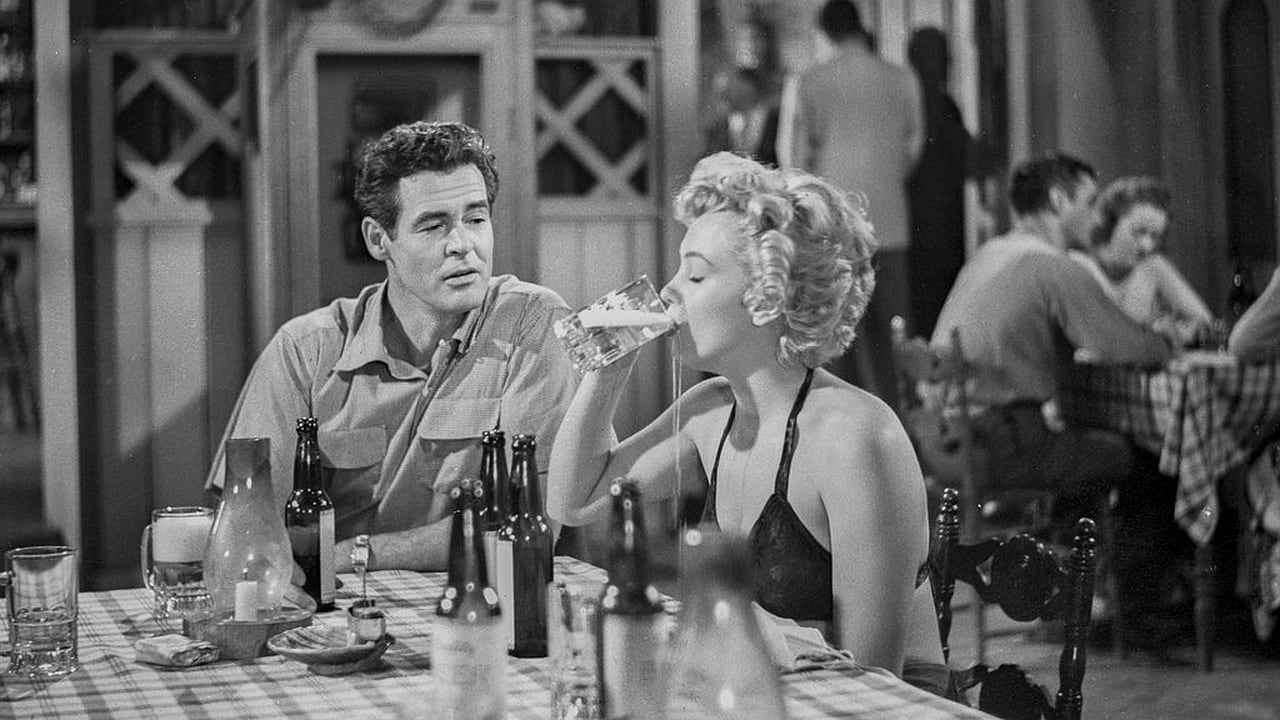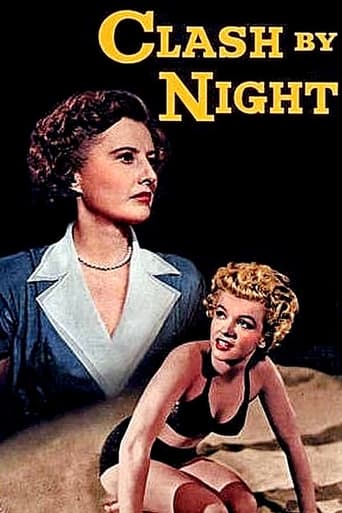

It's hard to see any effort in the film. There's no comedy to speak of, no real drama and, worst of all.
... View MoreI really wanted to like this movie. I feel terribly cynical trashing it, and that's why I'm giving it a middling 5. Actually, I'm giving it a 5 because there were some superb performances.
... View MoreIt is both painfully honest and laugh-out-loud funny at the same time.
... View MoreWatching it is like watching the spectacle of a class clown at their best: you laugh at their jokes, instigate their defiance, and "ooooh" when they get in trouble.
... View MoreI have very mixed feelings about this film. On the positive side, the acting is quite good (more about that shortly). But on the negative side, the director (Fritz Lang) made one mistake that pretty much kills a film for me.What's the big negative? There's not a single character here to like or respect or root for. They're all jerks. You start out with Mae Doyle D'Amato...a woman who can't control her emotions and seems to alienate everyone she is with. Then you have Jerry D'Amato, who's a nice guy, but such a sap...he can't figure out who his friends really are and when a woman is just taking him for a ride. Then you have Earl Pfeiffer, who's just no good, mean spirited, and lusts after anything in a skirt. Peggy is kinda dippy, but she's a relatively minor character, as is Joe Doyle, her boyfriend. Papa D'Amato drinks too much and gets in arguments with everyone. And Uncle Vince likes to set people against each other, and likes porn. Whadda bunch of low-lifes.Despite the lousy characters, the acting here is pretty decent. Barbara Stanwyck is darned good as the restless woman. Paul Douglas. not usually a favorite of mine (although I liked him in "Executive Suite") is very good here as the sap. Robert Ryan...was he good at acting sleazy, or was he sleazy? Marilyn Monroe, who I have little use for, is actually quite pleasant here, albeit in a minor role. Keith Andes as her boyfriend just seemed a bit too angry for no apparent reason. Silvio Minciotti does his job as the papa, and J. Carrol Naish...well, I couldn't figure out if he was petty, or the character was...or both.One critic at the time wrote that Fritz Lang, as a director, never showed much restraint. And I would agree here. A little subtlety here and there would have worked wonders.For the acting, a "7". For the directing, a "5". That's a "6", and for me, that's a below average film.
... View MoreRaw, emotional drama with top performances. Seething with pent-up emotions Barbara Stanwyck is the seen it all gal who comes home as she says because she's run out of places to go. She's brilliant here giving a finely judged portrayal of a woman at the end of her rope, you can feel her weariness. Paul Douglas is touching as the somewhat clueless schlub who falls for Barbara and Robert Ryan adds another superior performance to his gallery of less than honorable men. Keith Andes as Barbara's brother is fine even if his character is a sexist jerk. It's interesting to see Marilyn Monroe playing just a regular girl, albeit a very attractive one but no sexpot, coming across well in a part that is an anomaly in her filmography. Moodily directed by Lang which is perfect for the material.
... View MoreThe strength of this film is in the clearly drawn characters and character development as the film progresses. The acting is excellent. There is also a good sense of atmosphere and place, especially in the beginning. The unfolding of the plot is consistent with these characters, and seems almost inevitable. And that is part of the problem. You can sense where the movie is going, and it seems to take forever to get there. Meanwhile, you are wondering, why should I care?The secondary couple, Marilyn Monroe and her boyfriend, don't get a lot of screen time and are not closely integrated into the plot. They are there, presumably, for some moral message about relationships, though what that is is not entirely clear. Apparently, it is that women like strong, protective, domineering men, even, or especially, women who are strong, themselves.It is, of course, interesting to see Marilyn in an early role, before she had become somewhat typecast as a ditsy blonde. Here she is only slightly ditsy, but otherwise gives good depth and naturalness to her character. The wonderful luminous vulnerability that was her strength is already there. The movie opens with great promise, the atmosphere of the sea and the cannery, and then you see Fritz Lang and Clifford Odets in the credits, and you think perhaps you have come across a forgotten masterpiece. Not quite. In the perspective of the times, there was some really wretched acting coming out of Hollywood in the early 1950s, especially in the historical epics. But there were also some great serious dramas, like From Here to Eternity, Streetcar Named Desire, and Marty. Clash by Night seems to mix elements of all three. Audiences probably would have been drawn in by the juicy theme of adultery, and I guess it would have been pretty spicy for the times. Overall, it is an interesting, erudite movie, if somewhat boring. The big mystery, though, is what does the title mean: "Clash by Night"?
... View MoreI bought this film on the star power of a young Marilyn Monroe alone. What I purchased was a lot of overwrought acting and hand wringing from a cast headed by Barbara Stanwick. The focus of the stark storyline is Barbara Stanwicks Mae Doyle character. Suffering from bitter hard life choices, regrets, loneliness and under lying lust and passion. Upon returning home from an illicit love affair gone wrong, Mae settles for 2nd best and marries the towns local dull fisherman. She eventually has his child but then ends up committing adultery with her husbands best buddy( Robert Ryan). She even contemplates abandoning the child to be with her secret new lover. This film must have been considered pretty daring stuff during the early 1950's. Along the way there is a lot of emotional speech making, overly dramatic love scenes, and dialog that are to me in this day and age laughable. With that said, any fan of Barbra Stanwick or Marilyn Monroe should see this movie.The direction of the film by Fritz Lang is tight with location shots and sets that are completely realistic and believable. I did tire of the symbolic waves pounding the beach after every dramatic turn of the plot. The style of film-making, acting, and plot line are completely appropriate for the era of this film. I just don't see it as true Film Noir, I see it as a tepid melodrama. I must also admit I did have a strong urge to fast forward to scenes only involving Marilyn Monroe. I watched the whole film and Marilyn Monroe forcefully dominates the very few scene's she is in. I really liked the tough girlishness she was allowed to project as "Peggy". Her character is not written as the dumb blonde persona she would regretfully embody later in her career. Although her scenes are somewhat brief you cant ignore the magnetic star power she possessed. It should be noted that Marilyn was not appreciated or well liked during the production of "Clash by Night". Her co-stars did not like the press attention that she generated while on set. Particularly a jealous Robert Ryan. He bellowed on set "They never take pictures of of the rest of us".."Why do the photographers only want pictures of that blonde bitch Marilyn Monroe"?.. he later shouted to her on set,"Don't EVER call me Robert.. It's Mr. Robert Ryan to you"...Its also been said Marilyn had trouble remembering lines, and was sometimes late for filming. She also came to the set regularly with red blotches on her face and hands after having vomited from being so nervous. Barbra Stanwick later had Monroe barred from the set if "Peggy" wasn't in any of her scenes being shot that day because it was to disruptive.. Upon its release, around the same time as Monroes "nude calender" shots were surfacing "Clash by Night" was a box office success. It brought in $1.5 million dollars. Aside from mixed reviews, movie goers were curious about its provocative star. The film certainly furthered her career but it made her a few enemies in return.
... View More